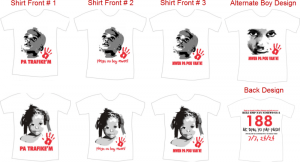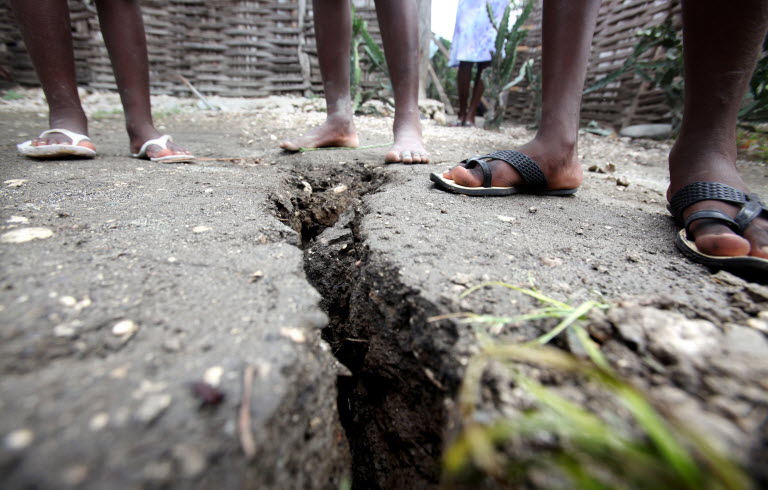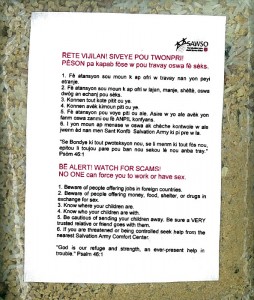Haiti and Human Trafficking Project
Haiti and Human Trafficking Coalition
Following the earthquake in Haiti (January 12, 2010) Global Centurion brought a dozen NGOs together in partnership to form the Haiti and Human Trafficking Coalition (HHTC). The Coalition designed projects to raise awareness about the ways in which vulnerabilities following a natural disaster can lead to human trafficking.
Social Marketing & Education Campaign
Global Centurion spear-headed these low-tech, grass-roots social marketing and education campaign. The campaign is designed to reach Haitians by distributing deliverables with messaging on them. Phase I of the campaign included distributing approximately one million food packets with anti-trafficking messages, as well as creating and playing a series of Creole anti-trafficking jingles on popular radio stations in Haiti.
Demand & Awareness Trainings
In addition, GC developed specialized briefings for relief and development workers, health providers, U.S. military, UN peacekeepers and private contractors emphasizing the importance of best behaviors while defending or protecting vulnerable and at risk populations. In Phase II of the Project, GC has trained over 60 Haitians, including health providers, attorneys, teachers, business leaders, pastors, and university students to serve as anti-trafficking trainers in their own communities. These trainings and briefings are presented around the theme, Its Time and feature a series of sayings in Creole on T shirts, water bottles, and other deliverables, including, Its Time to Protect our Children, Its Time to Remember our Anti-Slavery Heritage, Its Time for Human Rights.
Food Packet Messaging
Over 1 million food packets with our Be Alert Dont Fall for Scams message went out under the Salvation Army World Serve Offices food distribution program in the first two months of the aftermath of the earthquake. We realize that Haitians need support for starting up their own food businesses and that we need to move from a crisis intervention mode to a rebuilding mode, but this very successful messaging campaign was the earliest to go out to the general Haitian population when Haitians needed basics like food and water.

Anti-Trafficking T-Shirt Messaging
Global Centurion has partnered with Foundation Espoir to produce t-shirts, which both promote anti-trafficking messaging as well as advertising the “188” Haiti-wide HELP line developed by U.N.-NGO collaborations. In addition to handing out T-shirts in camps, we also got them into the hands of NGO leaders, camp managers, and community leaders as well as all the radio/TV stations that have supported our message. T-shirts are very popular in Haiti and offer a powerful means by which to communicate on a grassroots level.
As part of our campaign to combat human trafficking in Haiti through our Social Awareness Campaign the following 6 t-shirt designs have been finalized and printed. Our first print run is 1,500 T shirts with more print runs planned.
On the back of each t-shirt is a toll free Haiti-wide HELP line developed by the U.N. in conjunction with a number of NGOs. We plan to provide T shirts to all the camps and to NGO leaders, camp managers, and community leaders as well as all the Radio/TV stations that have supported our message. Haitians love T shirts and we hope that this wonderful grass-roots campaign will catch on in other cities and camps too.
Relief & Development Briefings; Medical Protocols
Working with several NGOs and FBOs, we developed a short briefing to help new volunteers and relief and development workers understand how to recognize human trafficking and how to treat it. In addition, working with Doctors at War on Trafficking, we were able to distribute a laminated medical protocol they developed and distribute to health care providers in Haiti.

Anti-Trafficking Radio Jingles in Creole
Thanks to our partnership with Love146 and the leadership of Lamont Hibert and Rob Morris,we were able to create two excellent anti-trafficking songs that are being played on Signal Radio in Haiti. The jingles, with two different messages (Live Free and Be Alert) were launched in a press conference held by our partner organization, Fondation Espoir, with 7 news outlets in attendance, including:
- Signal FM (Radio)
- Tele Eclair (TV ch. 4)
- Aquin Inter (Newspaper + radio)
- Journal Verite Plus + Radio Maximum
- TNH (National Television, Haiti ch. 8)
- R. Magozton (Radio)
- 1 Freelance/independent media
Mwen Vle Viv Lib (I Want to Live Free)
by Jude Exantus and Jonny Rodgers
Global Centurion and Love146 – for permission to use please contactGlobal Centurion
Nonm pa prale mesye (No Im not going with you sir)
Nonm pa prale madanm (No Im not going with you maam)
Mwen pa konnenw (I dont know you)
Fanmim pa konnenw (My family doesnt know you)
Wap vin ofrim lajan (Youre offering me money)
Mwen pa vle vin restavA?k (But I dont want to become a child slave)
Mwen vle viv lib pou mwen ka jwe (I want to live free so I can play)
Poum aprann li aprann ekri (Learn how to read and to write)
Poum itil peyim (So I can be useful for my country)
Pote mwen sekou (Everyone, help me)
Siveye (Watch Out)
by Lamont Hiebert and Jude Exantus
Global Centurion and Love146 – for permission to use please contactGlobal Centurion
Siveyep tA?t paw (Watch out for yourself)
Rete vijilan siveye twonpri (Be alert. Watch out for scams)
Yo pa ka fA?sew travay ni fA? sA?ks (No one can force to work or have sex)
Siw wA? yap vann moun (If you see human trafficking,)
Maltrete timoun (or child abuse)
Ou pa dwe pA?, se pouw denonse. (Dont be afraid to speak up)
Siveye youn pou lA?t (Watch out for each other)
Siveyep tA?t paw (Watch out for yourself)
Ayiti SMS Helpline to Address Violence Against Women/Children and Child Trafficking
Under Global Centurion’s leadership and through the partnership of the Haiti Human Trafficking Coalition (HHTC), we launched the Ayiti SMS Helpline Project, a SMS help line designed to monitor and combat gender-based violence, child abuse and human trafficking across Haiti’s tent cities.
Individuals, camp managers and other leaders can report instances of violence and exploitation via SMS text messaging, tweets, or directly through our website. Our implementation of Ushahidi and Frontline SMS allows us to keep track of all reported cases and address problem areas. Fondation Espoir & La Federation National de la Jeunesse pour le Development (FNJD) have been trained to use this system to spot, and address, trouble spots. FNJD’s mobile psych/social/medical support clinics can than be leveraged to deliver services as they are needed.
Background:
Since the earthquake, many organizations have been sending warnings about increased risk of violence against women and children. Thousands of displaced people are sleeping in public spaces, women are obliged to bathe under the eyes of residents/passers, children often sleep alone at night because parents are away working. It is not easy for Haitians to report violence at this time. According to (a women’s grassroots organization dealing with needs of rape victims), they learned women are often unable to lodge complains because they were afraid of the attackers in the camp, of police, or had no place to go. Not trusting the police to protect them, and knowing that the justice system is paralyzed, they prefer to keep quiet.
In the absence of a formal centralized system for recording cases of violence, our project works on a grassroots level to support camp managers and community leaders to protect women. Using SMS allows a discrete, quiet, and private means to communicate for help from someone they can trust. We are concentrating this effort to 50 camps managed by FNJD (spread around PaP, PetionVille, Carrefour etc), which is currently home to 147,000 people.
What does the Helpline do?
By texting the Ayiti SMS Helpline, you will join a larger anti-trafficking network. You will receive regular texts from our team about the latest news on trafficking, articles, cases and other pertinent/timely information. In addition, we can do the following:
- 1. Victim Identification: FNJD/Fondation Espoir will offer the Helpline # to vulnerable communities/key stake holders and first responders. They will organize numbers based on camp locations. This way, the network will be first point of contact for a potential victim.
- Distribute Information: FNJD can regularly send mass texts to their target communities about popular scams, latest cases, and other resources.
- Referrals, Victim Services & Protection: Once victims are identified and are out of his/her situation, they immediately present a wide variety of service needs. An Adequate response requires a comprehensive service program including power/skills of law enforcement, social service providers and NGO advocates. The FNJD Psych/Soci clinic will process cases and/or refer victims to the proper contact and give assistance where needed. Referral #s and groups include: MINUSTAH, UNICEF etc.
- Status Updates: Allows network to stay in touch with individual clients/survivors/vulnerable people.
- Geospatial Mapping: Allows network to maintain a visual of where problem-areas are and where they need to concentrate efforts.
Copyright 2012 – Global Centurion



